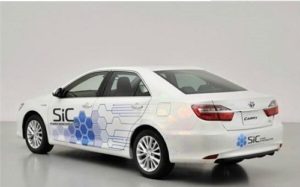- Alumina
- Boron Nitride
- Zirconia
- Other Ceramics
- Applications
- Contact
The continuous development of electric vehicles, smart power grid, nuclear power and solar energy, as well as navigation, aviation, aerospace, high-speed rail transit and other energy fields in emerging industries has put forward higher requirements for the performance of power devices. This makes silicon carbide, a third-generation semiconductor material, more widely used in emerging industries. In this passage, we’ll talk about silicon carbide usages the electric vehicle field, new type power transmission system, the solar energy field and LED lighting.
At present, the power devices based on silicon materials are approaching the theoretical limit determined by the properties of the materials themselves with the improvement of their structural design and manufacturing process. The third-generation semiconductor material can replace the first-generation semiconductor material silicon to meet the higher demand in the future and will be more widely used in the industry.
Wide bandgaps of semiconductor material
The third-generation semiconductor material has wider banding width, higher breakdown electric field, thermal conductivity, electron saturation rate and higher radiation resistance, and is suitable for making high-temperature, high-frequency, radiation-resistant and high-power devices. The representative materials are silicon carbide, gallium nitride, zinc oxide, diamond, and aluminum nitride.
At present, the most mature third-generation semiconductor material with the greatest application potential is silicon carbide, and its various indexes are better than silicon, and its banding width is almost three times that of silicon. Besides, the theory working temperature of silicon carbide devices is 600 ℃, which is far higher than that of silicon devices. Here are some typical silicon carbide usages.
Silicon carbide is advanced electronic material. It is the core of the EV charging module and electric module in the future and can realize the energy supply, low-carbon, intelligent and sustainable development of green travel. Silicon carbide ceramic will finally seize the commanding height of future industrial development.
The improvement of the charging module performance of silicon carbide devices is mainly reflected in three aspects:
(1) to improve the frequency and simplify the power supply network;
(2) to reduce loss and temperature rise;
(3) to reduce the volume and improve efficiency.
Silicon carbide components can improve the power conversion performance of pure electric vehicles or hybrid vehicles. In the electric vehicle’s electric module, the motor is the active load and its rotating speed range is wide, and it needs frequent acceleration and deceleration during the driving process, so the working conditions are more complicated than the general speed regulating system.

Silicon carbide vehicle
Silicon carbide power switch is an ideal substitute for silicon-based devices because of its extremely low open state resistance, and it can be applied to high voltage, high temperature and high frequency applications. If the silicon carbide power module is used, the power loss caused by switching loss can be reduced by more than five times compared with the silicon power supply device. This will have a significant impact on future grid configuration and energy strategy adjustments, with a reduction of more than 40 percent in size and weight.
Silicon carbide-based power switch
Silicon carbide usages in th solar industry include high-power modules such as solar inverters, uninterruptible power supply devices, and wind turbine motor drivers to achieve smaller sizes, lower material costs, and higher efficiency. The typical conversion efficiency of the new standard solar silicon-based inverter is close to 96%, while the average efficiency of SiC-based inverter can be improved to 97.5%, which is equivalent to a 25% reduction of inverter loss. Besides, SiC-based inverter can improve conversion efficiency by 20% in the wind power field.
LED lights made of silicon carbide
At present, the technology and application the core materials of LED optoelectronic devices, such as silicon carbide, gallium nitride and other third-generation semiconductor materials, are becoming a new strategic highland of the global semiconductor industry. Silicon carbide LED lighting equipment can reduce the number of original LED lights by 1/3, reduce the cost by 40-50%, and increase the brightness by twice, thermal conductivity by more than 10 times.
All kinds of signal lights, interior lighting, information screens, color display equipment and white light lighting can be seen in daily life use silicon carbide LED semiconductor lighting, which can achieve higher electro-optical conversion efficiency, as well as achieve the purpose of significantly reducing costs and pollution.
Thank you for reading this article and we hope it can help you know more about silicon carbide usages in emerging industries. If you are interested in more information, we would like to advise you to visit China Special Ceramic Parts, Inc..